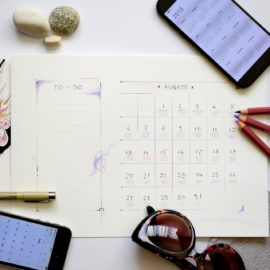

This article is an excerpt from the Shortform book guide to "Codependent No More" by Melody Beattie. Shortform has the world's best summaries and analyses of books you should be reading.
Like this article? Sign up for a free trial here .
Are you looking to better yourself? What are some examples of development goals that you should set for yourself?
Setting personal development goals for yourself requires focusing on yourself and acknowledging your needs. For that reason, many people have a difficult time setting personal goals and following through with them. These goals are especially useful for people who struggle with codependency and self-esteem.
Here are eight examples of good goals to set for yourself this year.
Goal #1: Find Balance
These examples of development goals are mostly inspired by Melody Beattie’s book Codependent No More. In her book, Beattie maintains that the most important goal for codependents is finding balance, primarily in how you give and receive love. Everyone needs love, but you can’t allow that need to overpower your other needs: Give and receive love while still living your own life and looking forward to your future.
Usually, Beattie explains, finding balance in love requires a recalibration of how you search for love. Unhealthy relationships make you trade your life for the other person’s care and affection. When you have become used to this kind of relationship, changing how you search for love seems impossible.
So how do you find that balance? Beattie says you must be honest about your unhealthy relationships, challenge your ingrained beliefs about relationships, and change your actions to match. For example, Jane admits that her relationship with her boyfriend is unhealthy: She’s given up her own life to keep the relationship. She challenges her ingrained belief (that she has to give up everything to be a good partner) by reciting self-love affirmations, and she changes her behavior by restarting her other activities and refusing to drop them for her boyfriend.
| Why You Fall Into Unhealthy Relationships and How to Avoid Them Beattie says that past experience and ingrained beliefs cause you to lose yourself in unhealthy relationships. Another reason is that you have come to associate intensity with intimacy. In the first few weeks of a relationship, you throw yourself in headfirst, abandoning other responsibilities or activities for your partner. The intensity of feelings and the speed of the relationship makes you feel like you’re gaining intimacy, which makes it hard to be honest with yourself. You think intensity means things are going well, when in reality a true foundation of trust and intimacy takes time. Beattie suggests challenging your ingrained beliefs to maintain healthy relationships. These are also called limiting beliefs: negative thought patterns that change how you think about yourself and your relationships. Thoughts like “this is the only kind of love I’ll ever find,” damage your self-confidence and make you more likely to settle for unhealthy relationships. Here are a few ideas for avoiding these pitfalls and changing your behavior, as Beattie suggests: 1. Take your relationship slow to build true intimacy. 2. Don’t sacrifice the rest of your life for the relationship. Maintain your other responsibilities, interests, and hobbies. 3. Challenge your limiting beliefs. Track down the sources of these beliefs and see if they actually make sense. 4. Be active in caring for yourself and making decisions that make you happy. Focus on yourself as an individual, not as just half of a relationship. |
Goal #2: Have Fun
Fun is hard for codependents, Beattie states. When you have spent so long believing that you don’t matter, you think you don’t deserve to have fun and feel guilty for taking time for yourself. However, fun is vital for enjoying life. Fun allows you to celebrate the good in the world and encourages you to keep living and healing.
Taking time for yourself and doing activities you enjoy will get easier the more you practice, Beattie explains. If you’re not sure what you enjoy doing, adjust the goal to finding those things. Try lots of different activities and explore with an open mind.
| The Importance of Fun Beattie believes fun is important, but is it really? In A Theory of Fun For Game Design, Raph Koster defines fun as a hit of dopamine from learning something or mastering a new skill. That dopamine, along with its fellow serotonin, helps decrease unhealthy stress hormones like cortisol. This makes you happier and more hopeful, and lets you see the good things in life. It also improves sleep, blood pressure, and memory. In addition, doing fun activities increases creativity, curiosity, and productivity. So yes, it’s very important. Start easy in your search for fun, with things that you find interesting and tasks you know you can do. Starting with minimal challenge will give you the mental space to overcome feelings of discomfort and will guarantee you the hit of dopamine Koster references. Once you become more comfortable, you can challenge yourself by exploring different activities. |
Goal #3: Set Strong Boundaries
Boundaries are also difficult for codependents, but setting strong boundaries is vital to living your own life, Beattie argues. Having weak boundaries leads you to be overly tolerant for a long time before hitting a peak of anxiety and stress, after which you become intolerant even of normal human behavior and mistakes. (Shortform note: Weak boundaries leave you open to being hurt by other people. After you reach a peak of hurt, your weak boundaries become rigid, with no understanding or compassion.)
Beattie suggests watching your reactions. Find a healthy balance of maintaining your boundaries while understanding that people are not perfect. Communicate your boundaries clearly, and then hold them firmly. Don’t let people guilt you, ignore your boundaries, or try to adjust your boundaries.
(Shortform note: Some people argue that your boundaries should be flexible, but only in certain circumstances. You might clear your schedule when a family member ends up in the hospital, for example, but not in everyday life. You might also give leeway when your family is adjusting to setting and respecting boundaries, but everyone must have the intention of learning, rather than weakening each other’s boundaries.)
| How to Set Healthy Boundaries Research supports Beattie’s assertion that setting strong boundaries is important. There are five kinds of boundaries, all of which are important for living your own life: physical, sexual, intellectual, emotional, and financial. Each kind of boundary needs to be strong. Here are a few tips for strengthening them: 1. Reflect on your current boundaries or ones you are thinking of setting. Figuring out why they’re important to you will help you maintain them. 2. Set boundaries early in new relationships. If your partner won’t respect your boundaries right off the bat, it’s probably not a healthy relationship. 3. Create a “framework” for your boundaries. A framework is made of repeating activities that enforce your boundaries. For example, scheduling an hour of alone time every weekend or deciding you won’t respond to work messages after hours. |
Goal #4: Practice Healthy Intimacy
According to Beattie, intimacy feels dangerous for many codependents. They might have been hurt by an intimate partner, or they might have never learned how to form intimate relationships. Some people are so used to unhealthy relationships that a lack of intimacy has become a habit. However the lack of intimacy came about, it causes limited relationships that make you feel distant and isolated from your loved ones.
(Shortform note: Beattie’s description of a fear of intimacy mirrors the traits of anxious-avoidant attachment, where you crave intimacy but are afraid of it. To overcome this fear, look at the facts of a situation when you start worrying, pay attention to how and when you push people away, and work on mutual support, rather than caretaking or relying only on yourself.)
In a way, Beattie adds, codependents are right: Intimacy is a risk. It’s showing someone your most vulnerable parts and hoping they don’t reject you. But codependents tend to think that they must avoid this pain even at the cost of relationships. Rejection is not the end of the world. You can handle your emotions, heal, and move on to better relationships. It is possible to find people who will love you, and it is possible to love people in return.
(Shortform note: Rejection is painful for everyone. Rejection hits an instinctual part of you, an evolutionary remnant of when rejection from a group meant death. However, rejection doesn’t have such dramatic consequences in modern times. The best way to handle rejection is to follow Beattie’s guidelines for self-care and distancing to process your emotions. Spending time with loved ones reminds you that they accept you, even if you were rejected by someone else.)
| Healthy Relationships Are Possible Healthy relationships feel impossible after experiencing rejection, escaping an unhealthy relationship, or never having learned how to be intimate. However, experts agree that you can find a healthy relationship by having good standards for your partner. Let’s look at a few examples of good standards: 1. They’re interested in you. This doesn’t mean they’re infatuated, like many new couples are. Someone who’s genuinely interested in you likes hearing about your interests and enjoys spending time with you, even without a romantic or sexual component. 2. They respect you. They treat your time and energy as valuable, and they defend your privacy and autonomy. 3. They’re willing to grow. This is important for all parties in a relationship. If you’re not willing to grow, the relationship will fail. If you and your partner grow together, you will have a deeper and more meaningful relationship. |
Goal #5: Have a Healthy Sex Life
Codependents have unhealthy sex lives. If the rest of your relationship is in shambles, your sex life will be too, Beattie explains. Sex cannot save, restore, or cause love. It just shows what’s already there. To make your sex life healthier, be honest with what you need and want sexually, both with yourself and with your partner.
(Shortform note: The keys to a healthy sex life don’t just lie in sex: You have to improve the rest of your relationship too. Spending time together, communicating openly, and showing affection every day increases intimacy and improves the whole relationship. Making plans or scheduling times to have sex helps too: Flirting and setting the mood can revitalize your sex life.)
Goal #6: Enjoy Peace
Beattie explains that codependents sometimes find themselves bored and listless after escaping their stressful situation. When your normal has become constant chaos and turmoil, even healthy change is daunting. For some, this chaos and anxiety are not only normal but what make them feel alive. In fact, some codependents expose themselves to family illnesses and chaos to return to that comfort zone. (Shortform note: The more anticipated a return to normality or escape from stress, the more likely you are to minimize the stress of the transition. When confronted with this new stress, you feel tempted to return to the situation you’re familiar with.)
Beattie stresses that this reaction does not mean you’re a bad person. Reprogramming your brain to react in healthier ways takes time. Accept that it might be a while before you enjoy the peace you’ve found, but remember that you will adjust to it.
| Boredom Isn’t Always Bad The boredom that Beattie discusses is increasingly emerging in the age of online dating. Most people think this means the relationship is failing. However, boredom isn’t always a bad thing. There are three components to a strong relationship: passion, intimacy, and commitment. Most people spend a long time moving between short-term relationships, which means they never leave the passion stage. The passion stage lends a sense of excitement and mystery to the relationship. Once you enter a stable relationship and start transitioning to the second stage, these traits are replaced by intimacy and comfort. Because these traits are less dramatic, you wonder what happened to the excitement and mystery. You feel bored without them. But that “boredom” is a sign of a strong relationship. But how are you supposed to adjust to this new stage of a relationship? This is when the third element comes into play: commitment. You have to make a firm decision to go deeper into the intimacy stage, even if it means leaving some of the passion behind. For the codependent struggling to adjust to peace, this means making a commitment to yourself. You’re not going to run back into danger because it’s exciting, and you will allow your relationships with yourself and with happiness to grow stronger. |
Goal #7: Take Care of Your Body
Beattie maintains that codependency goes hand-in-hand with a lack of self-esteem, as discussed in Chapter 3. A lack of self-esteem often leads to self-hatred and not taking care of your body or appearance.
It is important to take care of your body and appearance, Beattie explains, because how you treat yourself influences how you feel. If you dress in clothes you don’t like and never brush your teeth, your lack of confidence and feelings of self-hatred will intensify. However, if you wear clothes you like and keep up your personal hygiene, you’ll feel more attractive and confident. You deserve health and happiness, and taking care of yourself is the best way to achieve this.
| The Connection Between Hygiene and Enclothed Cognition Lacking self-esteem and neglecting to care for your body and appearance is not unique to codependency. Many people suffering from mental illnesses have trouble with personal hygiene. By working through the underlying issues in therapy or by practicing detachment, you can improve your relationship with hygiene. Improving personal hygiene and dress changes your attitude and encourages self-esteem through “enclothed cognition.” This means you associate certain traits with certain appearances. If you dress in a nice dress or collared shirt, for example, you’ll feel attractive and professional because those are the associations you have with that appearance. Enclothed cognition can also alter behavior. People who were given a white coat and told it was a doctor’s coat had increased levels of focus. Because the participants associated doctor’s coats with authority, intelligence, and focus, they emulated those traits while wearing the coat. Thus, you can change the way you dress to boost your self-confidence. |
Goal #8: Achieve Financial Independence
Codependents are dependent on another person for emotional security, as discussed in Chapter 6. According to Beattie, this emotional dependence results in financial dependence as well. Financial dependence traps you in a powerless position, whether you’re relying on someone else to provide the finances or providing them by yourself.
Finding financial independence means evaluating the division of financial responsibility in the home, Beattie explains. Consider whether you’re putting too much financial responsibility on the other person or taking too much yourself. While you don’t have to get a job if you enjoy being the homemaker of your family, it can help your self-esteem. Having skills people will pay for boosts confidence, and having your own money makes you feel more secure.
(Shortform note: Financial independence also makes it easier for women to set boundaries. Because they can take care of themselves, financially independent women can set higher standards for partners and have healthier relationships.)
| The Dangers of Financial Dependence Research supports Beattie’s idea that financial dependency makes you powerless, and adds that it easily becomes abuse. Financial abuse means one member of a relationship is unable to leave because they have no access to money. Emotional and financial abuse go hand-in-hand, just like emotional and financial dependence, because an abusive individual is seeking to control every aspect of their partner’s life. Even in cases where there is no abuse, being dependent can lead to nasty surprises such as surprise debt. Also, if the dependent relationship ends, you’ll be left with no knowledge of your money or ability to manage it. Taking an active role in finances doesn’t have to mean making all the decisions. It means knowing the necessary information and deciding if the decisions and division of responsibility are fair. Pay attention, ask questions, and do research if you need to. If your partner tries to stop you from learning about finances, look even closer: They might be trying to hide something from you. |

———End of Preview———
Like what you just read? Read the rest of the world's best book summary and analysis of Melody Beattie's "Codependent No More" at Shortform .
Here's what you'll find in our full Codependent No More summary :
- What inspired codependency 12 Step Programs around the country
- Explanations, advice, and compassion for people struggling with codependency
- How to practice detachment, self-care, and personal responsibility






